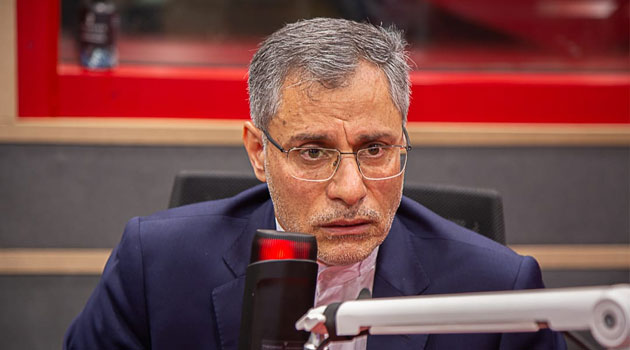
Iran rejects ‘absolutely fabricated’ isolation claims amid nuclear standoff » Capital News
NAIROBI, Kenya, Jul 14 — Iran’s Ambassador to Kenya, Ali Gholampour, has dismissed claims that his country is facing diplomatic isolation amid escalating tensions with Israel.
Instead, the diplomat asserted that a majority of the international community has condemned recent attacks on Iranian territory.
Speaking on Capital in the Morning, Gholampour described the narrative of Iran’s isolation as “absolutely fabricated” and “misleading.”
“Very honestly, no — that’s not the right thing. It’s absolutely fabricated. Up until now, more than 120 countries have condemned the aggressions,” Gholampour said, referencing the June 13 Israeli assault on key nuclear facilities and the targeting of senior Iranian commanders and nuclear scientists.
He stated that over 120 countries and major international organizations had strongly condemned what he termed “aggressions by the Zionist regime and the United States against Iranian facilities, cities, and civilians.”
Gholampour cited condemnations from the Arab League, Non-Aligned Movement, Gulf Cooperation Council (GCC), and the Organization of Islamic Cooperation (OIC) as evidence that Iran is not diplomatically isolated.
Countries that publicly condemned the attacks include Oman, which labeled Israel’s actions a “dangerous and reckless escalation” and a “violation of international law,” as well as Türkiye, Qatar, the United Arab Emirates (UAE), the United Nations, and the International Atomic Energy Agency (IAEA).
He told Capital in the Morning on Monday added that continental and regional blocs such as China, Russia, France, the European Union, and the African Union also expressed concern over the escalation.
Grassroots support
The ambassador also pointed to expressions of solidarity from civil society and grassroots movements, including in Kenya.
“When it comes to civil society, NGOs, and people-based organizations, even the people of Kenya — they are not happy with that kind of aggression. That aggression goes against the Charter of the United Nations, to which all countries are signatories and bound by its principles,” he said.
Gholampour reaffirmed Iran’s position that its military response was a legitimate act of self-defense under Article 51 of the UN Charter, following Israeli airstrikes targeting Iranian interests.
He claimed the attacks resulted in the deaths of over 1,100 people, including 700 civilians — among them women, children, journalists, and hospital patients.
“I live in Tehran, and they destroyed areas near my home — where ordinary people live. These are war crimes. They are indiscriminate, disproportionate, and violate the Geneva Conventions,” Gholampour said.
Nuclear compliance
The ambassador further accused Israel and the United States of violating global nuclear non-proliferation protocols and undermining the authority of the IAEA.
“To give you one example: more than 50 per cent of the IAEA’s budget has been spent on inspections in Iran. Our facilities are under constant surveillance — daily inspections, cameras, inspectors — and then you call them a threat? It’s absolutely against all rules and logic. Nobody can believe that,” he argued.
Gholampour criticized the UN Security Council for what he described as a failure to prevent aggression against Iran and hold Israel accountable for violations of international law.
“The entity responsible for enforcing international law is the Security Council — but unfortunately, we are seeing inaction,” he said.
He referenced UN Security Council Resolution 487 (1981), which unanimously condemned Israel’s bombing of Iraq’s nuclear facilities and called on Israel not to repeat such actions.
Gholampour questioned why similar protections have not been extended to Iran.
Tensions in the region
The diplomatic standoff comes amid heightened tensions in the Middle East, following Israel’s war in Gaza and Iran’s growing regional involvement.
In April, Iran launched missile and drone attacks on Israeli military sites, claiming it was retaliating for an airstrike on its consulate in Damascus.
Israel, with US support, has accused Iran of destabilizing the region through its backing of militant groups like Hezbollah in Lebanon and the Houthis in Yemen.
Despite the sharp rhetoric, Gholampour maintained that Iran advocates for peace and seeks diplomatic solutions through international cooperation and adherence to global law.
“We believe that all peace-loving nations and people around the world — and their governments — should condemn these atrocities and acts of aggression. They must take appropriate measures to stop them and prevent their recurrence in the future,” he said.